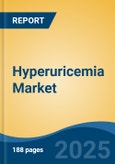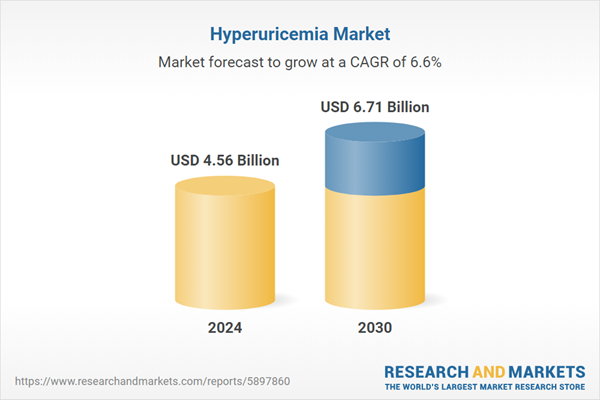Speak directly to the analyst to clarify any post sales queries you may have.
10% Free customizationThis report comes with 10% free customization, enabling you to add data that meets your specific business needs.
Hyperuricemia is commonly associated with gout, a form of inflammatory arthritis, and is also linked to other medical conditions such as kidney stones and cardiovascular disease. The market has experienced notable growth in recent years, propelled by several key drivers.
Key Market Drivers
Rising Prevalence of Hyperuricemia
The increasing global incidence of hyperuricemia serves as a primary growth catalyst for this market. In the United States alone, approximately 38 million people - over 11% of the population - are affected by this condition. Globally, this trend is being fueled by lifestyle factors such as poor dietary habits, physical inactivity, and the growing prevalence of obesity. Notably, in 2022, over one billion individuals worldwide were classified as obese, a condition strongly correlated with elevated uric acid levels.This rising prevalence has led to heightened demand for both diagnostic tools and therapeutic solutions. Greater public awareness regarding the health risks posed by hyperuricemia has led to increased medical consultations, encouraging early diagnosis and proactive disease management. Furthermore, the aging global population is another significant contributor, as the risk of hyperuricemia rises with age due to diminished renal function. By 2050, individuals aged 60 and above are expected to constitute 22% of the global population, up from 12% in 2015 - further intensifying the need for effective management and treatment strategies.
Key Market Challenges
Lack of Routine Screening
One of the critical challenges facing the hyperuricemia market is the limited implementation of routine screening protocols. Hyperuricemia often progresses silently, with few or no symptoms until it leads to more serious complications such as gout, kidney stones, or cardiovascular disorders. Without routine screening, many individuals remain undiagnosed until the condition reaches an advanced stage, resulting in delayed treatment and elevated healthcare costs.Routine screening not only enables early detection but also provides an opportunity for patient education and preventive intervention through lifestyle modifications - such as improved diet, weight management, and physical activity. Proactive screening is thus a cost-effective strategy to mitigate long-term health complications and reduce the economic burden on healthcare systems.
Key Market Trends
Focus on Research and Development (R&D)
Innovation through research and development has emerged as a central theme in the evolution of the global hyperuricemia market. With strong correlations between hyperuricemia and other debilitating conditions like gout and cardiovascular disease, the need for advanced therapeutic solutions has intensified.Pharmaceutical companies and academic research institutions are actively pursuing novel treatment approaches, including gene therapy aimed at modifying the genetic pathways that regulate uric acid metabolism. Such innovations could lead to more effective and precisely targeted interventions.
Another emerging trend is the integration of precision medicine into hyperuricemia management. By leveraging patients’ genetic, biochemical, and lifestyle data, healthcare providers can deliver highly customized treatment plans that enhance efficacy and reduce adverse effects - ultimately improving patient outcomes.
Ongoing research is also deepening the understanding of the biological mechanisms underlying hyperuricemia and its comorbidities. These insights are aiding in the development of more sophisticated diagnostic tools and next-generation therapeutics, thereby driving sustained market growth.
Key Market Players
- Arthrosi Therapeutics, Inc
- Dr. Reddy's Laboratories Ltd.
- Urica Therapeutics, Inc
- Zydus Lifesciences
- Takeda Pharmaceutical Company Limited
- Novartis AG
- Hikma Pharmaceuticals Plc
- Mylan N.V.
- AstraZeneca Plc
- Sun Pharmaceutical Industries Ltd
Report Scope:
In this report, the Global Hyperuricemia Market has been segmented into the following categories, in addition to the industry trends which have also been detailed below:Hyperuricemia Market, By Type:
- Primary
- Secondary
Hyperuricemia Market, By Drug Type:
- Xanthine Oxidase Inhibitors
- Nonsteroidal Anti-Inflammatory Drugs
- Corticosteroids
- Others
Hyperuricemia Market, By Route of Administration:
- Oral
- Injectable
Hyperuricemia Market, By Distribution Channel:
- Hospital Pharmacies
- Retail Pharmacies
- Online Pharmacies
Hyperuricemia Market, By Region:
- North America
- United States
- Canada
- Mexico
- Europe
- France
- United Kingdom
- Italy
- Germany
- Spain
- Asia-Pacific
- China
- India
- Japan
- Australia
- South Korea
- South America
- Brazil
- Argentina
- Colombia
- Middle East & Africa
- South Africa
- Saudi Arabia
- UAE
Competitive Landscape
Company Profiles: Detailed analysis of the major companies present in the Global Hyperuricemia Market.Available Customizations:
With the given market data, the publisher offers customizations according to a company's specific needs. The following customization options are available for the report.Company Information
- Detailed analysis and profiling of additional market players (up to five).
This product will be delivered within 1-3 business days.
Table of Contents
Companies Mentioned
- Arthrosi Therapeutics, Inc
- Dr. Reddy's Laboratories Ltd.
- Urica Therapeutics, Inc
- Zydus Lifesciences
- Takeda Pharmaceutical Company Limited
- Novartis AG
- Hikma Pharmaceuticals Plc
- Mylan N.V.
- AstraZeneca Plc
- Sun Pharmaceutical Industries Ltd
Table Information
| Report Attribute | Details |
|---|---|
| No. of Pages | 188 |
| Published | April 2025 |
| Forecast Period | 2024 - 2030 |
| Estimated Market Value ( USD | $ 4.56 Billion |
| Forecasted Market Value ( USD | $ 6.71 Billion |
| Compound Annual Growth Rate | 6.6% |
| Regions Covered | Global |
| No. of Companies Mentioned | 10 |









